名师总结:英语六级完形务必掌握的重要表达
六级作文常用词汇短语
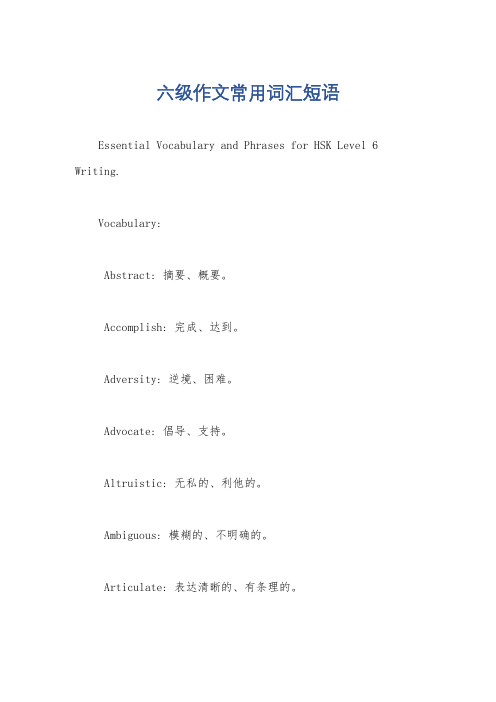
六级作文常用词汇短语Essential Vocabulary and Phrases for HSK Level 6 Writing.Vocabulary:Abstract: 摘要、概要。
Accomplish: 完成、达到。
Adversity: 逆境、困难。
Advocate: 倡导、支持。
Altruistic: 无私的、利他的。
Ambiguous: 模糊的、不明确的。
Articulate: 表达清晰的、有条理的。
Assertive: 自信的、有主见的。
Attain: 获得、达到。
Authentic: 真实的、可信的。
Phrases:Analyze the current situation: 分析当前形势。
Construct a comprehensive plan: 制定全面计划。
Demonstrate a clear understanding: 表现出清晰的理解。
Develop a well-structured response: 提出结构良好的对策。
Evaluate the pros and cons: 权衡利弊。
Formulate a sound argument: 形成有力的论据。
Highlight the significance: 强调重要性。
Identify key issues: 找出关键问题。
Implement effective strategies: 实施有效战略。
Maintain a critical perspective: 保持批判性视角。
中文回答:常用的词汇:抽象。
完成。
逆境。
倡导。
无私。
模糊。
自信。
获得。
真实。
常用的词组:分析当前形势。
制定全面计划。
表现出清晰的理解。
提出结构良好的对策。
权衡利弊。
形成有力的论据。
找出关键问题。
实施有效战略。
保持批判性视角。
英语六级复习资料(完整版)
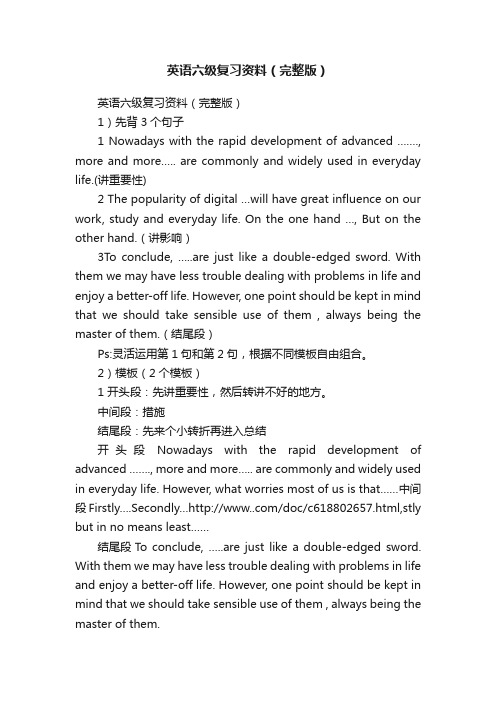
英语六级复习资料(完整版)英语六级复习资料(完整版)1)先背3个句子1 Nowadays with the rapid development of advanced ……., more and more….. are commonly and widely used in everyday life.(讲重要性)2 The popularity of digital …will have great influence on our work, study and everyday life. On the one hand …, But on the other hand.(讲影响)3To conclude, …..are just like a double-edged sword. With them we may have less trouble dealing with problems in life and enjoy a better-off life. However, one point should be kept in mind that we should take sensible use of them , always being the master of them.(结尾段)Ps:灵活运用第1句和第2句,根据不同模板自由组合。
2)模板(2个模板)1 开头段:先讲重要性,然后转讲不好的地方。
中间段:措施结尾段:先来个小转折再进入总结开头段Nowadays with the rapid development of advanced ……., more and more….. are commonly and widely used in everyday life. However, what worries most of us is that……中间段Firstly….Secondly…/doc/c618802657.html,stly but in no means least……结尾段T o conclude, …..are just like a double-edged sword. With them we may have less trouble dealing with problems in life and enjoy a better-off life. However, one point should be kept in mind that we should take sensible use of them , always being the master of them.2 开头段:先讲重要性,然后转讲争论中间段:转折(即列出两种不同人的观点)结尾段:直接进入总结(即你的观点)开头段:It is accepted that …. Plays a significant part for both …, and what’s more , a lot of attention is being drawn to the change of….. However, whether …deserves such an attention , people’s ideas vary.中间段:On the one hand, some peop le hold the view that …..On the other hand, a great many people insist that….结尾段:From my perspective, however…. (你的观点) . Therefore, it’s time that (措施之类的)6级作文万能句子(补充在”…..”里面的万能句子,自己琢磨每个句子放在哪里比较适合)重点背:1)5)6)7)句子,最好全部都被过一遍,自己琢磨怎么用。
英语六级写作时态与语态使用技巧
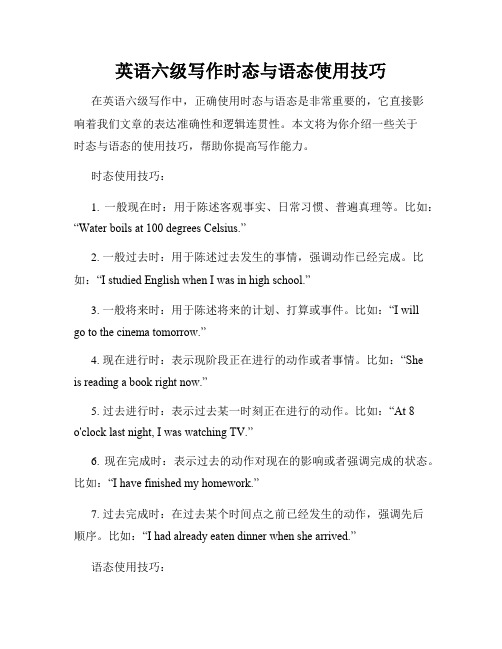
英语六级写作时态与语态使用技巧在英语六级写作中,正确使用时态与语态是非常重要的,它直接影响着我们文章的表达准确性和逻辑连贯性。
本文将为你介绍一些关于时态与语态的使用技巧,帮助你提高写作能力。
时态使用技巧:1. 一般现在时:用于陈述客观事实、日常习惯、普遍真理等。
比如:“Water boils at 100 degrees Celsius.”2. 一般过去时:用于陈述过去发生的事情,强调动作已经完成。
比如:“I studied English when I was in high school.”3. 一般将来时:用于陈述将来的计划、打算或事件。
比如:“I willgo to the cinema tomorrow.”4. 现在进行时:表示现阶段正在进行的动作或者事情。
比如:“Sheis reading a book right now.”5. 过去进行时:表示过去某一时刻正在进行的动作。
比如:“At 8o'clock last night, I was watching TV.”6. 现在完成时:表示过去的动作对现在的影响或者强调完成的状态。
比如:“I have finished my homework.”7. 过去完成时:在过去某个时间点之前已经发生的动作,强调先后顺序。
比如:“I had already eaten dinner when she arrived.”语态使用技巧:1. 主动语态:强调主语是动作的执行者,常用于陈述事实和评论观点。
比如:“He wrote a novel last year.”2. 被动语态:强调动作的接受者,常用于无法确认或者不重要的对象。
比如:“The book was written by him.”3. 使役语态:表示主语引起或者使对方进行某种动作。
比如:“I had my car repaired yesterday.”4. 双宾语语态:句子的宾语由两个,常见的结构是“give/ send/ offer/ show/ tell/ teach + 宾语 + 间接宾语”,表示主动与被动的关系。
六级完型填空

六级完型填空简介六级完形填空是六级英语考试中的一项重要测试内容。
完形填空考察考生对语言的理解与运用能力,以及对语境推测和逻辑关系的把握。
在这一项测试中,考生需要在一篇短文中填入正确的单词,使其语义和整个短文的语境相符,同时还要注意语法、逻辑和内容的连贯性。
通过这项测试,考官可以评估考生的英语综合能力和阅读理解能力。
考试要求六级完形填空测试通常包含一篇短文以及若干个空白,每个空白处有四个选项供选择。
考生需要在规定时间内,根据短文的意思和上下文的线索,选出最佳选项。
以下是一些应注意的要求:1.分析上下文的语境,理解短文的大意。
2.掌握常见英语词汇和短语的含义和用法,以确保选择正确的选项。
3.注意单词的词性,根据上下文判断所需的词性。
4.掌握常见的语法规则,将其应用于填空题。
5.注意选项之间的逻辑关系和语法正确性,选择符合语境和逻辑的选项。
解题技巧为了更好地应对六级完形填空测试,考生可以尝试以下解题技巧:1. 首先阅读全文在开始填写任何答案之前,首先快速阅读一遍短文,了解其大意和整体结构。
这将帮助你更好地理解句子之间的逻辑关系,并为后续选择正确的选项提供线索。
2. 根据上下文推测意义在遇到不熟悉的单词时,可以通过上下文的线索来推测其意义。
注意短文中是否有对该词的解释或对其含义的暗示。
3. 注意词性和语法规则选择正确的单词需要注意其词性和适用的语法规则。
根据句子结构和上下文的需要,选择正确的形容词、动词、名词、副词等。
4. 注意选项之间的逻辑和语法关系在选择答案时,要注意选项之间的逻辑关系和语法正确性。
排除与短文内容不符合或与上下文不连贯的选项。
5. 注意修饰关系和多义词在填写形容词或副词时,要注意修饰关系,确保所选词汇与被修饰的名词或动词意义相符合。
此外,对于可能具有多个意义的单词,要根据上下文的需要选择正确的意思。
实战演练以下是一道六级完形填空的示例题目,供考生进行实战演练:(1) ____A____ in deep South, Tomb Republic is located just south of the Mexico border. It is a small country (2) ____B____ four and a half million people, a nd a GDP of $9 billion per year. Historically, it is known for two things: (3) ____C____ history of revolutions and the stunning natural beauty of its lands capes. However, in recent decades, Tomb Republic has faced a series of challen ges that have (4) ____D____ it to take action.One of the main challenges Tomb Republic faces is an extremely high poverty ra te. About 40% of its population lives below the poverty line. This poverty is (5) ____E____ be a result of a combination of factors, such as political insta bility and a lack of resources. The government has implemented various poverty reduction programs, but progress has been slow.Another challenge is illegal drug trafficking. Tomb Republic's proximity to Me xico and its porous borders have made it a hotspot for drug cartels. This has led to an increase in violence and crime. The government has (6) ____F____ wit h international organizations to strengthen border security and crack down on drug trafficking.In addition, Tomb Republic is also grappling with environmental issues. Defore station and pollution have significantly (7) ____G____ the country's natural b eauty. The government has recently launched initiatives to protect its forests and reduce pollution, but much work still needs to be done.Despite these challenges, Tomb Republic remains a resilient country with a ric h cultural heritage and a strong sense of community. Its people are (8) ____H_ ___ and determined to overcome the obstacles they face. With the support of th e international community, Tomb Republic has the potential to (9) ____I____ a brighter future.A. NestledB. WithC. AD. ForcedE. believedF. CollaboratedG. DiminishedH. resilientI. achieve答案及解析1. A. 根据下文的”in deep South”可以推测,Tomb Republic坐落在南方的某个地方。
英语六级语法常考知识点汇总

英语六级语法常考知识点汇总一、英语六级语法常考知识点:主语和谓语主语和谓语是句子的核心,它们之间有两种语序:一是主语在谓语之前称为自然语序(Natural Order);二是主语在谓语之后则称为倒装语序(Inverted Order)。
而倒装语序中又有全部倒装(Full Inversion)和部分倒装(Partial Inversion)两种情况。
首先,在全部倒装的句子中,要把整个谓语放在主语的前面去而构成倒装语序。
例如:There are large numbers of students in the lecture hall.(在There be…的句式中,There只是个引导词而不是主语,真正的主语是后面作表语的名词或者名词短语。
因此,There be…的句式都是全部倒装的句子。
)演讲厅里有大量的学生。
When he ran to the door, there stood a mid-aged man with a lantern in his hand .(此句是为了"描述情节的需要",把倒装当着修辞的手段而写成了全部倒装句。
句子的主语是a mid-aged man,谓语是stood 。
)当他向房门跑去时,那儿正立着一位手里拿着一盏灯笼的中年男人。
另外,在部分倒装的句子中,只把谓语的一部分(如情态动词、助动词、或是系动词be)放到主语的前面去,构成倒装语序。
例如:Are you going to take part in the football match against Accounting Department on Friday afternoon? (句子的谓语是are going to take part,are是句子的谓语的一部分;句子的主语是you 。
所以,此句是部分倒装的句子。
疑问句都是部分倒装句。
)你打算去参加星期五与会计系进行的足球赛吗?Hardly could he finish his test paper when the school bell rang .(由于语法要求的原因,本句写成了部分倒装的句子。
完形填空解题的6个技巧口诀

完形填空解题的6个技巧口诀嘿,咱来说说完形填空解题的六个技巧口诀哈。
先说说第一个口诀,“通读全文很重要,了解大意不瞎搞”。
有一回啊,我做完形填空的时候,一上来就急着填空,结果填得乱七八糟的。
后来我才知道,得先通读全文,了解一下大概讲的啥事儿。
就像你去一个陌生的地方,得先四处看看,心里有个底儿嘛。
第二个口诀是“前后联系要记牢,线索就在文章找”。
有一次,我碰到一个空,怎么都想不出来填啥。
后来我看看前面的句子,再看看后面的句子,嘿,一下子就有灵感了。
就像玩捉迷藏,线索就在周围,你得仔细找。
“固定搭配别忘掉,平时积累很有效”,这是第三个口诀。
比如说“take care of”“look forward to”这些固定搭配,你要是平时积累得多,做的时候就容易多了。
有一回,我就是因为不知道一个固定搭配,结果填错了。
后来我就把那些固定搭配都抄在一个小本本上,没事就看看。
第四个口诀是“语法知识要知道,句子结构分析好”。
有时候,你得根据语法知识来判断填什么词。
有一次,我看到一个句子,不知道该填动词的什么形式。
我就分析了一下句子结构,发现应该用动词的 ing 形式。
这下就对了。
“词义辨析要仔细,相似单词别搞混”,这是第五个口诀。
有些单词长得很像,意思却不一样。
你得仔细分辨。
有一回,我就把“accept”和“except”搞混了,结果填错了。
后来我就把这些容易搞混的单词都列出来,对比着记忆。
最后一个口诀是“复查一遍不能少,确保答案全对了”。
做完了完形填空,一定要再检查一遍。
看看有没有填错的地方,有没有漏填的地方。
有一次,我做完就交卷了,结果发现有一个空填错了。
要是我复查一下,就不会犯这个错误了。
总之啊,这六个口诀记好了,做完形填空就容易多了。
以后咱做完形填空的时候,就按照这六个口诀来,肯定能得高分。
嘿嘿。
四六级完形填空
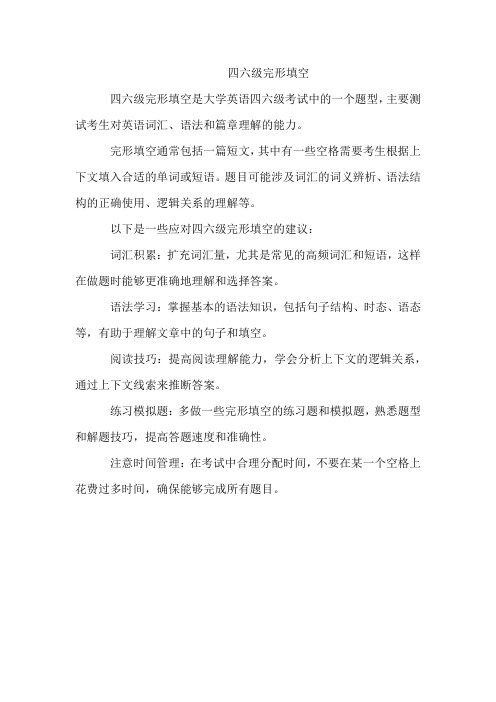
四六级完形填空
四六级完形填空是大学英语四六级考试中的一个题型,主要测试考生对英语词汇、语法和篇章理解的能力。
完形填空通常包括一篇短文,其中有一些空格需要考生根据上下文填入合适的单词或短语。
题目可能涉及词汇的词义辨析、语法结构的正确使用、逻辑关系的理解等。
以下是一些应对四六级完形填空的建议:
词汇积累:扩充词汇量,尤其是常见的高频词汇和短语,这样在做题时能够更准确地理解和选择答案。
语法学习:掌握基本的语法知识,包括句子结构、时态、语态等,有助于理解文章中的句子和填空。
阅读技巧:提高阅读理解能力,学会分析上下文的逻辑关系,通过上下文线索来推断答案。
练习模拟题:多做一些完形填空的练习题和模拟题,熟悉题型和解题技巧,提高答题速度和准确性。
注意时间管理:在考试中合理分配时间,不要在某一个空格上花费过多时间,确保能够完成所有题目。
英语六级语法常见考点归纳
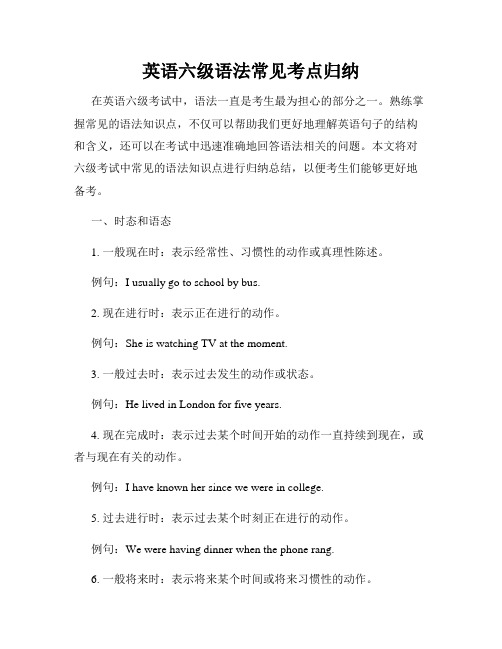
英语六级语法常见考点归纳在英语六级考试中,语法一直是考生最为担心的部分之一。
熟练掌握常见的语法知识点,不仅可以帮助我们更好地理解英语句子的结构和含义,还可以在考试中迅速准确地回答语法相关的问题。
本文将对六级考试中常见的语法知识点进行归纳总结,以便考生们能够更好地备考。
一、时态和语态1. 一般现在时:表示经常性、习惯性的动作或真理性陈述。
例句:I usually go to school by bus.2. 现在进行时:表示正在进行的动作。
例句:She is watching TV at the moment.3. 一般过去时:表示过去发生的动作或状态。
例句:He lived in London for five years.4. 现在完成时:表示过去某个时间开始的动作一直持续到现在,或者与现在有关的动作。
例句:I have known her since we were in college.5. 过去进行时:表示过去某个时刻正在进行的动作。
例句:We were having dinner when the phone rang.6. 一般将来时:表示将来某个时间或将来习惯性的动作。
例句:They will come to visit us next week.7. 被动语态:表示动作的承受者,强调动作的发出者。
例句:The book was written by Mark Twain.二、条件句1. 条件句类型一:表示对未来可能发生的事情进行设想或推测。
例句:If it rains tomorrow, we will stay at home.2. 条件句类型二:表示虚拟的条件,与事实相反。
例句:If I were you, I would study harder.3. 条件句类型三:表示过去的不可能发生的情况。
例句:If I had known about the plan, I would have joined.三、虚拟语气1. 虚拟语气用于表达非现实或假设的情况,通常包括以下几种情况:- 表示建议、要求、命令:I suggest that he (should) come early.- 表示愿望、要求、建议:I wish I were taller.- 表示假设的情况:If I were you, I would go.四、从句连接词1. 名词性从句:作为主语、宾语或表语,连接词有that, whether, what等。
- 1、下载文档前请自行甄别文档内容的完整性,平台不提供额外的编辑、内容补充、找答案等附加服务。
- 2、"仅部分预览"的文档,不可在线预览部分如存在完整性等问题,可反馈申请退款(可完整预览的文档不适用该条件!)。
- 3、如文档侵犯您的权益,请联系客服反馈,我们会尽快为您处理(人工客服工作时间:9:00-18:30)。
洛基英语,中国在线英语教育领导品牌
at large(=at liberty, free) 在逃, 逍遥法外at large(=in general) 一般来说, 大体上at large(=at full length; with details)详细地
accuse…of…(=charge…with; blame sb. for sth. ; blame sth. on sb. ; complain about) 指控,控告
allow for (=take into consideration, take into account) 考虑到, 估计到.
amount to (=to be equal to) 总计, 等于.
answer for (undertake responsibility for, be liable for, take charge for) 对…负责.
abide by(=be faithful to ; obey)忠于;遵守
comply with (=act in accordance with a demand, order, rule etc.) 遵守, 依从
apply to sb. for sth. 为…向…申请; apply for申请; apply to 适用.
apply to 与…有关;适用
arise from(=be caused by) 由…引起.
arrive on 到达; arrive at 到达某地(小地方);得出,作出; arrive in 到达某地(大地方);
be ashamed of (=feel shame, guilt or sorrow because of sth. done) 以…为羞耻
assure sb. of sth. (=try to cause to believe or trust in sth.) 向…保证, 使…确信.
attach(to) (=to fix, fasten; join) 缚, 系,结
attend to (=give one’s attention, care and thought)注意,照顾;attend on(upon)(=wait upon, serve, look after) 侍候,照料
in accordance with (=in agreement with) 依照,根据
on one’s own account 1) 为了某人的缘故, 为了某人自己的利益2) (=at one’s own risk) 自行负责3) (=by oneself)依靠自己on account 赊账; on account of
因为; on no account不论什么原因也不;of …account 有…..重要性.
take…into account(=consider)把...考虑进去
account for (=give an explanation or reason for) 解释, 说明.
on account of (=because of) 由于,因为.
be accustomed to (=be in the habit of, be used to)习惯于.
be acquainted with(=to have knowledge of) 了解; (=to have met socially ) 熟悉
act on 奉行,按照…行动; act as 扮演; act for 代理
adapt oneself to(=adjust oneself to) 使自己适应于
adapt…(for) (=make sth. Suitable for a new need) 改编, 改写(以适应新的需要)
in addition (=besides) 此外, 又, 加之
in addition to(=as well as, besides, other than)除…外
adhere to (=abide by, conform to, comply with, cling to, insist on, pe rsist in, observe, opinion, belief ) 粘附; 坚持, 遵循
adjacent(=next to, close to) 毗邻的, 临近的
adjust..(to) (=change slightly)调节; 适应;
have an advantage over 胜过. have the advantage of 由于…处于有利条件have the advantage of sb.知道某人所不知道的事
take advantage of (=make the best of, utilize, make use of, profit from, harness)利用.
attribute…to…(=to believe sth. to be the result of…)把..归因于.., 认为..是..的结果
begin with 以…开始. to begin with (=first of all) 首先, 第一(经常用于开始语)
on behalf of (=as the representative of) 以…名义
believe in(=have faith or trust in; consider sth.sb. to be true) 相信,依赖,信仰.
get the better of (=defeat sb.) 打败, 胜过.
by birth 在出生上,论出身,按血统at birth 在出生时; give birth to 出生
blame sb. for sth. 因…责备某人. blame sth. on sb. 把…推在某人身上
in blossom开花(指树木) be in blossom开花(强调状态) come into blossom开花(强调动作)
take the floor 起立发言
be capable of 能够, 有能力be capable of being +过去分词是能够被…的
compare…with …把…与…比较
compare…to…把…比作…
complain of (or about)抱怨;诉苦;控告;complain about 抱怨某人或事情; complain to sb. about sth. (or sb.) 向某人抱怨…; complain (抱怨); complement (补充); compliment (恭维)
delight in(=take great pleasure in doing sth.)喜欢, 取乐
take (a) delight in 喜欢干…, 以…为乐
demand sth. from sb. 向某人要求(物质的)东西
deprive sb. of sth. 剥夺某人某物
deviate from 偏离, 不按…办
on a diet 吃某种特殊饮食, 节食
differ from…in 与…的区别在于…
dispose of (=get rid of ,throw away)处理掉
beyond dispute不容争议的,无可争议
in dispute 在争议中
(be) distinct from ( = be different from) 与…截然不同
distinguish between (=make or recognize differences) 辨别
distinguish…from 把…与…区别开
do away with(=get rid of; abolish; discard eliminate) 除去,废除,取消; do away with (=kill) 杀掉, 镇压
come off duty 下班
“成千上万人疯狂下载。
更多价值连城的绝密英语学习资料,
洛基内部秘密英语,技巧,策略
请在网上申请报名”。
